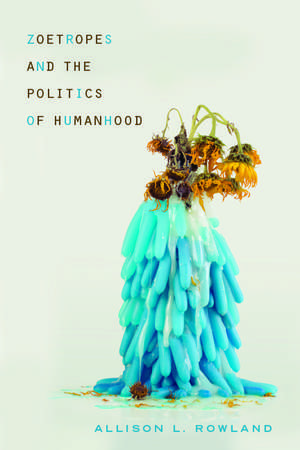Zoetropes and the Politics of Humanhood: New Directions in Rhetoric and Materiality
Autor Allison L. Rowlanden Limba Engleză Hardback – 27 apr 2020 – vârsta ani
Honorable Mention, 2021 Rhetoric Society of America Book Award
Honorable Mention, 2021 Marie Hochmuth Nichols Award for Outstanding Published Scholarship in Public Address
The way we talk about living beings can raise or lower their perceived value. Consider the pro-life strategy of calling a fetus a child, thereby effectively promoting the value of fetal life. In the opposite direction, calling a Pakistani child killed by a US drone strike collateral damage can implicitly demote the value of that child’s life. Allison L. Rowland’s Zoetropes and the Politics of Humanhood looks at such discursive practices—providing the first systematic account of how transvaluations like these operate in public discourse and lurk at the edges of all language.
Building on the necropolitical concept that we are constantly parsing populations into worthy lives, subhuman lives, and lives sentenced to death, Rowland’s study focuses specifically at zoetropes—the rhetorical devices and figures that result in such transvaluations. Through a series of case studies, including microbial life (at the American Gut Project), fetal life (at the National Memorial for the Unborn), and vital human life (at two of the nation’s premier fitness centers)—and in conversation with cutting-edge theories of race, gender, sexuality, and disability—this book brings to light the discursive practices that set the terms for inclusion into humanhood and make us who we are.
| Toate formatele și edițiile | Preț | Express |
|---|---|---|
| Paperback (1) | 248.28 lei 6-8 săpt. | |
| Ohio State University Press – 27 apr 2020 | 248.28 lei 6-8 săpt. | |
| Hardback (1) | 570.08 lei 6-8 săpt. | |
| Ohio State University Press – 27 apr 2020 | 570.08 lei 6-8 săpt. |
Preț: 570.08 lei
Preț vechi: 740.37 lei
-23% Nou
Puncte Express: 855
Preț estimativ în valută:
109.11€ • 113.72$ • 90.83£
109.11€ • 113.72$ • 90.83£
Carte tipărită la comandă
Livrare economică 06-20 ianuarie 25
Preluare comenzi: 021 569.72.76
Specificații
ISBN-13: 9780814214305
ISBN-10: 0814214304
Pagini: 190
Ilustrații: 2 b&w
Dimensiuni: 152 x 229 x 18 mm
Greutate: 0.46 kg
Ediția:1
Editura: Ohio State University Press
Colecția Ohio State University Press
Seria New Directions in Rhetoric and Materiality
ISBN-10: 0814214304
Pagini: 190
Ilustrații: 2 b&w
Dimensiuni: 152 x 229 x 18 mm
Greutate: 0.46 kg
Ediția:1
Editura: Ohio State University Press
Colecția Ohio State University Press
Seria New Directions in Rhetoric and Materiality
Recenzii
“Zoetropes and the Politics of Humanhood embodies the future of rhetorics of science, technology and medicine for the ways it thoughtfully connects rhetorical theory with foundational texts across disciplines and for its methodological and critical nuance. Offering rhetorical scholars a suite of constructs that can be mobilized in a range of projects, each of the book’s case studies … are rich inquiries into what Rowland elegantly refers to as ‘body-forging that occurs in the crucible of empire.’” —Selection Committee, 2021 Association for the Rhetoric of Science, Technology, and Medicine Book Award
“Zoetropes and the Politics of Humanhood does a masterful job of weaving together health rhetorics, citizenship, race, gender, and sexuality. … A marvel for rhetorical theory, necropolitics, and those invested in the hierarchical nature of life.” —Michael J. Benjamin, Rhetoric Review
“Through insightful and thought-provoking engagements with a variety of sites and texts, Zoetropes shows the promise of scholarly work at the intersection of rhetoric and biopolitics. From a brilliant reading of the history of rhetoric to the unpacking of the work of zoetropes in the everyday encounter with biopower, this books gives us an explanation of biopower as a rhetoric, and so a way to think creatively of contesting its reach.” —Kelly E. Happe
“Zoetropes brings together rhetorical and biopolitical theory in a groundbreaking study of how and why entities are brought into humanhood and granted ethical and political value. It offers a fresh take on how hierarchy is rhetorically constructed and deployed for social and political ends.” —Jenell Johnson
“Zoetropes and the Politics of Humanhood does a masterful job of weaving together health rhetorics, citizenship, race, gender, and sexuality. … A marvel for rhetorical theory, necropolitics, and those invested in the hierarchical nature of life.” —Michael J. Benjamin, Rhetoric Review
“Through insightful and thought-provoking engagements with a variety of sites and texts, Zoetropes shows the promise of scholarly work at the intersection of rhetoric and biopolitics. From a brilliant reading of the history of rhetoric to the unpacking of the work of zoetropes in the everyday encounter with biopower, this books gives us an explanation of biopower as a rhetoric, and so a way to think creatively of contesting its reach.” —Kelly E. Happe
“Zoetropes brings together rhetorical and biopolitical theory in a groundbreaking study of how and why entities are brought into humanhood and granted ethical and political value. It offers a fresh take on how hierarchy is rhetorically constructed and deployed for social and political ends.” —Jenell Johnson
Notă biografică
Allison L. Rowland is Maurer Associate Professor of Performance and Communication Arts at St. Lawrence University.
Cuprins
Contents
Acknowledgments
Preface
Introduction Hierarchy’s Thresholds
Chapter 1 Zoerhetorical Theory
Chapter 2 Human Microbiomes in Popular Science
Chapter 3 Fetuses at the National Memorial for the Unborn
Chapter 4 Vital Biocitizens at the Gym
Conclusion Humanhood’s Ambit
Bibliography
Index
Acknowledgments
Preface
Introduction Hierarchy’s Thresholds
Chapter 1 Zoerhetorical Theory
Chapter 2 Human Microbiomes in Popular Science
Chapter 3 Fetuses at the National Memorial for the Unborn
Chapter 4 Vital Biocitizens at the Gym
Conclusion Humanhood’s Ambit
Bibliography
Index
Descriere
Examines gut microbes, fetuses, and gym-goers in three case studies to critique the discursive practices of inclusion into humanhood.












